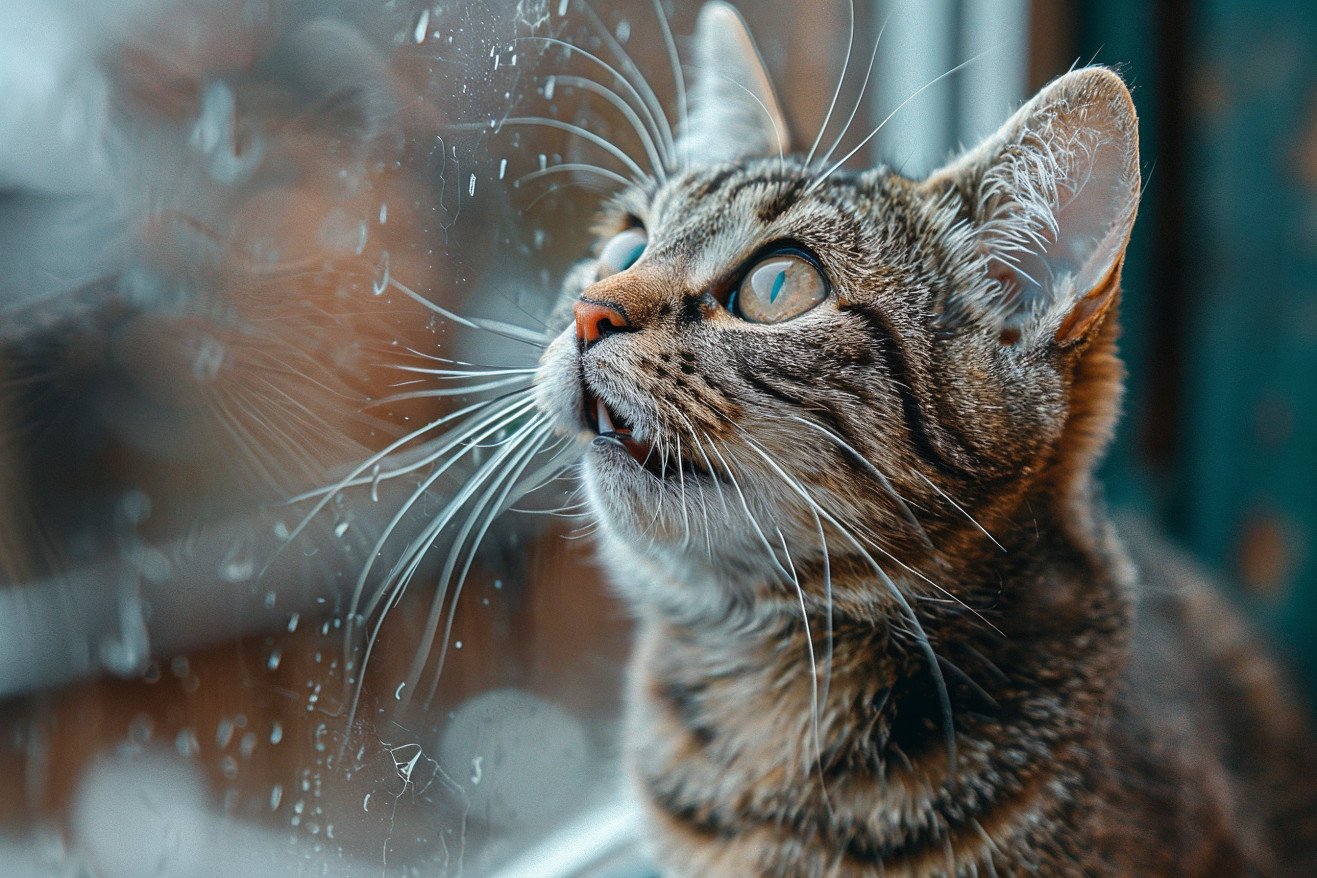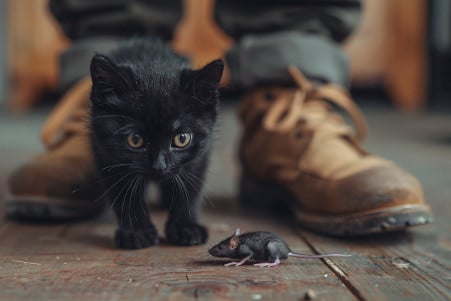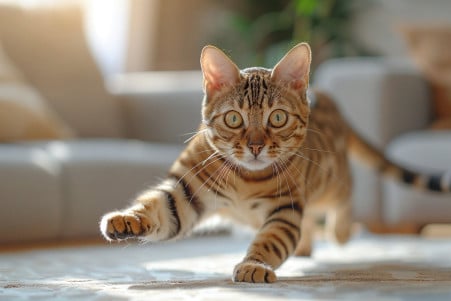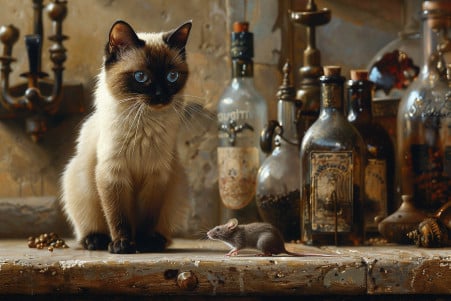Why Do Cats Chatter? Exploring the Primal Instincts Behind This Quirky Behavior
9 April 2024 • Updated 9 April 2024

If you've ever noticed your cat making a strange chattering noise while watching birds or squirrels out the window, you may be wondering why they do it. Here, we'll explore the fascinating reasons behind this quirky cat behavior. Cats chatter as a natural instinct when they see potential prey they cannot reach. This funny vocalization, likened to excited chirping, allows them to mimic killing the prey through jaw movements. It stems from the cat's deeply rooted hunting drive, even though house cats no longer require hunting for survival.
Our investigation into why cats chatter will draw insights from ethological studies on feline instincts and vocalizations. We'll look at how this unique behavior relates to a cat's predatory nature, stimulating their innate hunting reflexes. Through examining the evolutionary basis for chattering, you'll gain a deeper appreciation for the primal urges that shape your cat's charming quirks.
Why do cats chatter?
Why Do Cats Chatter at Birds?
Chattering is a behavior that hails back to a cat's predatory nature. When cats see birds or other prey, their predatory instincts kick in, causing them to experience a state of arousal and focus. As The Spruce Pets notes, chattering is considered a "solicitation call," which is a type of vocalization that cats make when they are aroused and seeking something, in this case, the unattainable prey.
It's thought that chattering is a reflexive behavior that simulates the action of biting the neck of a prey animal to kill it. According to Dr. Aimee Simpson, chattering is distinct from chirping vocalizations and is characterized by "a rhythmic stuttering of the jaw with the mouth opened in a tense position" that doesn't involve the vocal cords. This jaw movement is a voiceless action that reflexively simulates the act of killing prey.
Interestingly, this behavior may have been shaped by natural selection as a hunting strategy. Research cited by The Wildest documented wild margay cats using vocalizations to mimic the sounds of monkeys, which they believe may be used to confuse the primates and draw them in closer for an attack. In a similar way, domestic cats may chatter to mimic the sounds of their prey to make it easier to catch.
For indoor cats that no longer have to hunt for their food, chattering is a way to express their predatory instincts when they are visually stimulated, even if they can't actually catch the prey. By learning about the predatory behaviors that chattering is connected to, we can understand the primal instincts that drive our cats' idiosyncrasies.
Theories About Why Cats Chatter
There are two main theories that aim to explain why cats chatter and what it means when they do. These are the 'Swearing Theory' and the 'Mimicry Theory'. According to Drool by Dr. Chris Brown, the 'Swearing Theory' suggests that chattering is an expression of frustration when a cat cannot access or catch the prey it sees. The cat experiences a surge of adrenaline from the hunting instinct, but is unable to act on it, resulting in the chattering vocalization.
On the other hand, the 'Mimicry Theory' says that cats chatter to mimic the sounds of their prey, which could draw the prey closer and make it easier to catch. Research referenced by Catster has shown that Brazilian wildcats will mimic the calls of Tamarin monkeys when hunting them, which supports the idea that cats can use vocal mimicry as a hunting strategy.
Although both of these theories are plausible, Cat in a Flat says that the actual reasons for chattering are likely to be more complex and could include a combination of excitement, frustration, and instinctive hunting behaviors. This means that the jaw movement and sound of chattering could be used in a number of ways in a cat's hunting behavior.
Exploring the Fascinating Phenomenon of Cat Chattering
While chattering is a common behavior in cats, the frequency and intensity of the behavior can vary from cat to cat. According to Newsweek, "the degree to which cats exhibit the chattering behavior can depend on factors like the cat's level of excitement, preparation to pounce, and frustration at not being able to catch the prey."
Meanwhile, Cats.com suggests that some cats may be more prone to chattering than others, even when they're exposed to the same stimuli, like birds or rodents outside a window. The age, personality, and activity level of the cat can all play a role in how much a cat chatters. Cats that are more active or excitable may be more likely to chatter because their energy levels and hunting instincts are more easily aroused.
On the other hand, PetGuide points out that older cats or those with dental problems may be less likely to chatter because they're less able to move their jaws quickly or because they're in pain when they do so. These differences are normal and don't necessarily mean that there's anything wrong with a cat's behavior or health.
How to Deal With and Redirect Cat Chattering
Although chattering is a normal and harmless behavior, some cat owners may want to deal with or redirect it, especially if it happens too often or becomes disruptive. According to the MSPCA-Angell, one way to deal with chattering is to prevent cats from looking out of windows or from other vantage points that allow them to see potential prey.
Another way to deal with chattering is to redirect the cat's hunting behavior by providing other ways for them to express it, such as through interactive play or puzzle feeders. The MSPCA-Angell also suggests using positive reinforcement, such as giving cats treats or praise when they're being calm, to help reduce the frequency of chattering.
That said, if chattering is happening in conjunction with redirected aggression or fear, it may be time to seek help from a veterinarian or animal behaviorist. After all, as the Cornell University College of Veterinary Medicine points out, it's important to figure out why a cat is being aggressive because different causes may require different interventions.
That said, with a little bit of knowledge about why cats chatter and some effective ways to redirect the behavior, cat owners can help their pets express their hunting instincts in a way that's healthy and productive.
Conclusion: Understanding the Quirky Charms of Feline Hunters
Cat chattering is a complex behavior that offers a window into the hunting instincts and predatory nature of our pet cats. Although the exact causes of chattering are still not fully understood, it is evident that the behavior is closely tied to the cat's evolution as a hunter.
From the release of pent-up energy to the expression of frustration to the act of mimicking the sounds of prey, chattering enables indoor cats to satisfy their hunting instincts in a safe and controlled way. By learning about the origins and potential explanations for chattering, we can better appreciate the quirks and idiosyncrasies that have made cats such beloved pets.
While some cat owners may want to find ways to curb excessive chattering, it's important to acknowledge and accept this behavior as part of the cat's natural instincts. By embracing the quirks and curiosities of our feline friends, we can foster a deeper appreciation for the instincts that underlie their charming behaviors.


